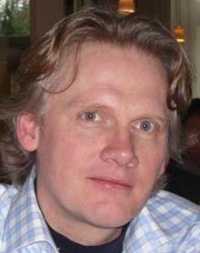Manfred Wiesner, Dipl.-Psych.
Psychologischer Psychotherapeut (PP),
Noackstr. 16 D-26121
Oldenburg, Germany
Email: ma.wiesner@gmx.de
While growing up in the heavily industrialized Ruhr Valley area of Germany in the sixties, seventies and eighties, Manfred´s childhood and adolescent selves were formed through relationships typical within that place and time. Some of these selves, for example, could often be found to be engaged in dialogues at a local kiosk or newsstand about recent developments within the national soccer league or the best places to get a curried sausage. At the same time, other selves chatted with like-minded others concerning the latest premiere at the (at least in Germany) much celebrated theatre company in Bochum. Most of these selves were embedded in a rather naive-realist/positivist world view up until Manfred began to frequent meetings of the `Bochumer Arbeitsgruppe für Sozialen Konstruktivismus und Wirklichkeitsprüfung´, or BOAG (www.boag.de) at the Ruhr-University-Bochum while studying psychology in the mid-80’s. One could say that at this time, his various selves began to diverge and diversify, epistemologically as well as philosophically. On the one hand, triggered through their various relationships within the field of academic psychology (and especially clinical psychology), selves emerged that could seek and find universal and deep psychological “meanings” in any human utterances. On the other hand, the academic subculture of the BOAG fostered critically reflective selves, ones that began to question taken for granted beliefs and “realities.” New perspectives about relationships and language, about multiple realities, multiple selves and multiple constructions of the world became more and more interesting to these selves. In other words, for Manfred’s many selves, social constructionism emerged and evolved as a preferred attitude towards life and a preferred perspective for understanding human phenomena².
As these ideas were explored, new relationships to others with similar orientations and interests augmented and expanded these performative selves. Together with his wife Sabine Röseler, some of their selves work together as trainers, educating health managers in human resource management, using theoretical assumptions of social constructionism. Together with his colleague and friend Eugene Epstein, some of their selves have been active for over fifteen years in designing, implementing and supervising child and adolescent psychiatric services based on the social constructionist ideas of the Gergens as well as the narrative ideas of Harry Goolishian. Some of their selves may be found during regular working hours at a clinic they designed within a city hospital in northern Germany. They like to invite other selves to share and expand upon their ideas by presenting them at conferences and workshops as well. Their selves share a common interest in developing and exploring new ways of utilizing popular media to illustrate social constructionist ideas. In addition to his preference for social constructionism, Manfred’s selves are currently interested in themes like the creation of the subject within psychotherapy relationships, the practical application and consequences of the sociological notion of inclusion for culture and society, the influence of economic discourses upon the health care system, and socially oriented leadership models. In addition to their roles as clinic supervisor and psychotherapist, Manfred’s selves are also engaged in work as supervisor, trainer, conference organizer and author.
² Although Manfred’s many selves strongly support the idea of polyvocality and multiple selves (or in Ken Gergen’s sense, “multiphrenia“), his selves are not now and never have been associated with vocabularies originating within traditional western psychiatric discourse around so-called “multiple personality disorders.”

